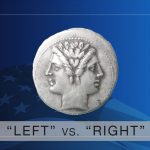Last Updated on August 20, 2022 by Constitutional Militia
Americans now know from rude experience what should have been obvious from simply examining the structure of Federal Reserve System as proposed in 1913:
• “Political money” in the hands of a central authority consisting of private bankers and their stooge politicians is fascism in the field of money and banking
• “Political money” infuses the economic principles of fascism into every aspect of life that currency and credit may affect.
• ”Political money” injects the political principles of fascism into every aspect of life in order to secure the dominance and permanence of the fascist economic system. Therefore,
• “Political money” is the precursor to and support for fascism in all things.
The Federal Reserve System’s “political money” was foisted on this country by so-called “progressives” during Woodrow Wilson’s Administration. Rightly understood, though, “political money” is the tool of the most rapacious reactionaries. Here, one must agree with Mao Tse-tung that
[a]ll reactionaries are paper tigers. In appearance, the reactionaries are terrifying, but in reality they are not so powerful. From a long-term point of view, it is not the reactionaries but the people who are really powerful.[13]
So, what is to be done with these reactionaries? WE THE PEOPLE must recall the wise admonition of Josiah Quincy, Jr., who asked, “What boundaries will they set to their passions, who have no limits to their power?”[14] Americans must stop pussy-footing around with half-measures, and instead strike at the heart of the beast, by imposing strict constitutional limitations on money and banking. To wit,
1. The only official governmental currency must be a time-tested sound currency, composed of a valuable commodity the supply of which the free market controls.
a. Each of the several States in the Union, as well as the United States, must officially recognize and affirm that a sound medium of exchange, adopted as official currency, is indispensable to the legally and politically just and economically efficient operation of both government and the free market at every level of the federal system.
b. Each of the several States in the Union, as well as the United States, must take all appropriate actions to adopt and preserve such a currency for the benefit of their citizens.
c. This currency must consist of weights of silver and gold as the only units of governmental money. No government within the federal system may emit “bills of credit”—that is, paper currency redeemable in silver or gold, either directly from its treasury or indirectly through any kind of bank, whether public or private, national, international, or supra-national. And, obviously, no government within the federal system may emit “bills of discredit”—that is, an irredeemable or fiat paper currency—either directly or indirectly.
d. Each of the several States in the Union, as well as the United States, which adopts silver and gold as official currencies for the performance of its governmental functions must be legally obliged to refrain from debasing those currencies, or from attempting to manipulate the purchasing power of one metal in terms of the other. Once the unit of the monetary system is fixedin (say) a weight of silver, that weight cannot be changed. And the free market must be allowed to set the weight of gold that exchanges against that weight of silver.
2. Absolutely free competition in currency must be guaranteed to every individual in every area of private financial activity.
a. Each of the several States in the Union, as well as the United States, must recognize that every individual enjoys the inherent and unalienable right to acquire, hold, and employ as his media of exchange whatever things he may in his own judgment prefer, including gold and silver coin and bullion in whatever forms may be provided by governments or by private enterprises.
b. None of the several States in the Union, nor the United States, may erect any barrier to the circulation within its territory of any medium of exchange which any State or the United States has adopted as an official medium of exchange or which private parties have chosen to employ in transactions among themselves.
c. None of the several States in the Union, nor the Union States, may impose any tax, charge, or financial penalty —whether denominated, calculated, or collected as a “sales tax”, “excise tax”, “income tax”, “capital gains tax”, “gross receipts tax”, or under any other rubric whatsoever—upon the exchange of one form of currency for any other form of currency.
d. None of the several States in the Union, nor the United States, may impose any tax, charge, or financial—howsoever denominated, calculated, or collected—with respect to any exchange of a particular form of currency for any non-monetary good, service, or other property of whatever type or description, and whether the transaction occurs in “commerce” or otherwise, on the grounds that the purchasing power of that form of currency at the time of such exchange is greater than its purchasing power when it was originally acquired by the person employing it in that exchange.
e. Except in the payment of taxes, fees, duties, imposts, excises, public dues, fines, or penalties assessed in substantive and procedural conformity with the Constitution, none of the several States in the Union, nor the United States, may compel any individual or legal entity to employ any particular medium of exchange in his or its financial transactions; or may require that any private debt, contract, or other obligation payable in money be paid in any medium of exchange other than the one the parties thereto have expressly or impliedly stipulated for payment.
f. None of the several States in the Union, nor the United States, may prevent or impede any individual or legal entity that charges a price or fee for any goods or service from: (i) specifying what medium or media of exchange will be accepted in payment for such goods or service; or (ii) applying a discount or a surcharge to such price or fee depending upon the particular medium of exchange or the method of payment employed by the person purchasing such good or service.
3. Private monetary holdings must be protected from police-state surveillance and interference.
a. Except to secure the collection of a valid tax, fee, duty, impost, excise, public due, fine, or penalty after a judicial determination thereof, and then only under the aegis of a warrant properly issued upon probable cause by judicial authority, none of the several States in the Union, nor the United States: (i) may seize gold or silver coin or bullion from, or claim title to or dominion over gold or silver coin or bullion possessed by, any individual or legal entity; or (ii) may purport to direct or license any third party, public or private, to seize, sequester, “freeze”, or otherwise withhold from any individual or legal entity gold or silver coin or bullion held by that party on behalf or in the interest of such individual or legal entity.
b. The extent, composition, and location of any individual’s or legal entity’s holdings of various media of exchange, including money on deposit with any private financial institution, and gold and silver coin and bullion held anywhere, may not be subjected to compelled disclosure of any sort, except under the aegis of a warrant properly issued upon probable cause by judicial authority.
4. There must be absolute economic and political separation of bank and state, coupled with rigorous governmental regulation of private financial institutions.
a. None of the several States in the Union, nor the United States, may create a governmental bank or like financial institution, or in any manner participate directly or indirectly in the operations of any private bank or any international or supra-national bank.
b. The regulation of private banks and other financial institutions by the several States and the United States must protect and vindicate the institutions’ depositors, creditors, debtors, and other clients against fraud and other malfeasance, mismanagement, and negligence. The principle to be put into practice was well stated by the Supreme Court in Hall v. Geiger-Jones Company, 242 U.S. 539, 552 (1917) (emphasis supplied):
[T]he power of the state to prevent frauds and impositions * * * applies as well to securities as to material products * * * . As to material products the purpose may be accomplished by a requirement of inherent purity. The intangibility of securities, they being representatives or purporting to be representatives of something else, * * * requires a difference of provision, and the integrity of * * * securities can only be assured by the probity of the dealers in them and the information which may be given of them.
c. This principle can best be applied to banks and other financial institutions through three interlocking measures:
(i) Institutional definition. This requires a full explanation as to whether the client or customer of the bank or other financial institution retains at all times ownership of the funds he deposits with or otherwise entrusts to that institution, or whether the institution succeeds to ownership of those funds upon their being so deposited or entrusted—that is, whether the client’s or customer’s account is a bailment account or simply evidence that the client or customer is a general unsecured creditor of the institution for the balance in the account.
If any client’s or customer’s funds are held in a bailment account, the bank or other financial institution must establish legal safeguards through the operation of which, in the event the institution becomes insolvent, illiquid, or otherwise fails to fulfill its obligations in a timely fashion, such funds will nevertheless be immediately transferred or transferrable to the possession and control of the client or customer, immune from any claims of the institution’s other creditors, a bankruptcy court, or any other incumbrance.
(ii) Institutional transparency. This requires preparing and publishing regular third-party audits of:
• the financial status and operations of each such institution, in terms of its profits, losses, deposits, reserves, assets (including stock, bonds, and other securities) and liabilities (both direct and contingent), and transactions with major clients (by type, value, and purpose), as well as all fees, charges, commissions, or other costs collected from or assessed against clients for or in connection with the institution’s various services; and
• the personal records and reputations of all partners, directors, officers, and other high-level managers of each bank or other financial institution, including such aspects of their personal financial status, investments, holdings, transactions, liabilities, and related matters as might affect the integrity, soundness, solvency, liquidity, operations, or other administration of the institution.
(iii) Institutional accountability. This requires that:
• deposit and credit-default insurance as well as fidelity bonding for all banks
and other financial institutions that accept any form of deposits from the general public will be offered as options for those depositors who wish to pay for such protection;
• an efficient, confidential means will be established by which depositors can file complaints with governmental agencies, so that appropriate investigations may be initiated in a timely fashion;
• such partners, directors, officers, or other high-level managers of such institutions as may be guilty of breaches of trust or repeated lapses in the diligence or care with which they perform their fiduciary responsibilities will be disciplined, through public or private reprimand, suspension or removal from office, civil fines, criminal penalties, or such other effective sanctions as may be appropriate under the circumstances;
• although institutions that engage in fully disclosed fractional-reserve banking practices and allied financial speculation may be allowed to operate, if any such institution fails to meet its obligations to its clients or creditors— and particularly if it fails to pay its depositors strictly according to the terms of their contracts—then that institution will immediately be placed in receivership and its assets, together with the personal assets of its partners, directors, officers, and other high-level managers, marshaled and frozen for the benefit of depositors, clients, and creditors;
• no financial institution which any form of mismanagement has forced or threatens to force into insolvency, illiquidity, bankruptcy, or other business failure will receive any direct payments of public funds, loans, loan guarantees, remission or suspension of taxes or other public dues or charges (by way of deductions, credits, forgiveness, postponements, or in any other form), or other financial assistance or benefits of any kind, directly or indirectly, from any State or the United States;
• severe penalties of fines and imprisonment will be imposed in the courts of both the several States and the United States upon partners, directors, officers, and other high-level managers for criminal conviction of fraud, misrepresentation, counterfeiting, embezzlement, theft, or any other malfeasance that affects any of a financial institution’s depositors, clients, creditors, debtors, or other interested parties; and
• civil actions in the courts of both the several States and the United States will be liberally allowed on behalf of aggrieved depositors, clients, creditors, debtors, and other interested parties against financial institutions and their partners, directors, officers, and other high-level managers, with provision for expedited and extensive discovery, class actions, declaratory and injunctive relief, punitive damages, and attorneys’ fees.
These are the minimum reforms the American people must demand, immediately if not sooner—of every incumbent public official and of every candidate for public office.
Critics may complain that these reforms will not fix all of this country’s terrible problems. Perhaps not. There are no universal panaceas. But, as the Chinese say, “a journey of a thousand miles begins with a single step”. At the present moment, this country is standing on quicksand. Its choice is either to move or to sink. The time for thinking, the time for talking, and especially the time for stalling in the vain hopes that something may turn up and that the economy will muddle through are past. It is time for action.
Footnotes:
1. To be sure, these were not Roosevelt’s own, original ideas, but instead derived from his formative experiences in the Woodrow Wilson Administration. See Thomas Fleming, The New Dealer’s War: F.D.R. and the War within World War II (New York, New York: Basic Books, 2001), at 326 & note 39.
2. The Federalist No. 10.
3. U.S. Const. preamble.
4. Act of 16 June 1933, ch. 90, 48 Stat. 195.
5. A.L.A. Schechter Poultry Corp. v. United States, 295 U.S. 495, 537 (1935).
6. Actually, this “Bush Doctrine” is nothing new. It is merely the logical expansion of old “Brezhnev Doctrine” now embossed with the Stars and Stripes rather than the Hammer and Sickle. Under “the Brezhnev Doctrine”, the Soviet Union claimed the right to invade any country among its satellites that deviated too far from the Communist Party line as enunciated in Moscow. Under “the Bush Doctrine”, the United States claims the right to impose crippling economic sanctions upon, to ring with military bases, and if those tactics do not work then to launch ersatz “wars of national liberation”, to bomb, and even to invade, any country, without distinction, that refuses to subordinate its economy to the dictates of the Financial Axis that runs from London, through New York City, to the District of Columbia.
7. Recorded on film by Leni Riefenstahl in “Triumph des Willens”.
8. 2009—DHS-ICE entered into a contract for 200,000,000 rounds of .40 S&W ammunition over the ensuing five years. 2011—FBI awarded a contract for up to 100,000,000 rounds of .40 S&W ammunition over the ensuing five years. 2012—DHS awarded a contract for 450,000,000 rounds of .40 S&W ammunition over the ensuing five years.
9. Declaration III (1899).
10. Part 2, Article 8, § 2(b)(xix).
11. This prohibition stems from the Declaration of St. Petersburg (1868).
12. See my demolition of Holder’s contentions in “Where is the Outrage?”
13. Quotations From Chairman Mao Tse-tung (Peking, China: Foreign Languages Press, 1966), at 72.
14. Observations on the Act of Parliament, commonly called the Boston Port-Bill; with Thoughts on Civil Society and Standing Armies (London, England: Edward and Charles Dilly, 1774), at 50.
ra©2012 Edwin Vieira, Jr. – All Rights Reserved.



































